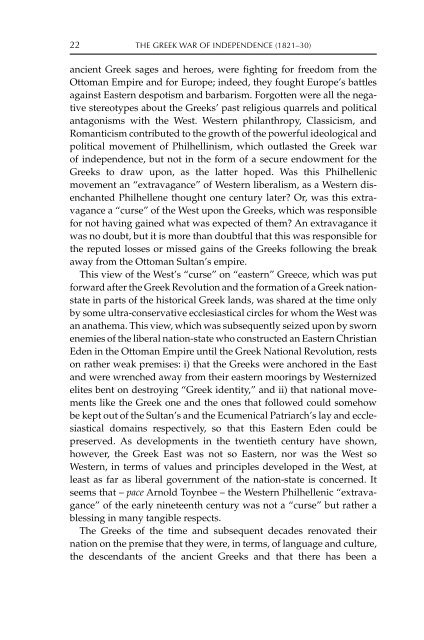MODERN GREECE: A History since 1821 - Amazon Web Services
MODERN GREECE: A History since 1821 - Amazon Web Services
MODERN GREECE: A History since 1821 - Amazon Web Services
Create successful ePaper yourself
Turn your PDF publications into a flip-book with our unique Google optimized e-Paper software.
22 THE GREEK WAR OF INDEPENDENCE (<strong>1821</strong>–30)<br />
ancient Greek sages and heroes, were fighting for freedom from the<br />
Ottoman Empire and for Europe; indeed, they fought Europe’s battles<br />
against Eastern despotism and barbarism. Forgotten were all the negative<br />
stereotypes about the Greeks’ past religious quarrels and political<br />
antagonisms with the West. Western philanthropy, Classicism, and<br />
Romanticism contributed to the growth of the powerful ideological and<br />
political movement of Philhellinism, which outlasted the Greek war<br />
of independence, but not in the form of a secure endowment for the<br />
Greeks to draw upon, as the latter hoped. Was this Philhellenic<br />
movement an “extravagance” of Western liberalism, as a Western disenchanted<br />
Philhellene thought one century later? Or, was this extravagance<br />
a “curse” of the West upon the Greeks, which was responsible<br />
for not having gained what was expected of them? An extravagance it<br />
was no doubt, but it is more than doubtful that this was responsible for<br />
the reputed losses or missed gains of the Greeks following the break<br />
away from the Ottoman Sultan’s empire.<br />
This view of the West’s “curse” on “eastern” Greece, which was put<br />
forward after the Greek Revolution and the formation of a Greek nationstate<br />
in parts of the historical Greek lands, was shared at the time only<br />
by some ultra-conservative ecclesiastical circles for whom the West was<br />
an anathema. This view, which was subsequently seized upon by sworn<br />
enemies of the liberal nation-state who constructed an Eastern Christian<br />
Eden in the Ottoman Empire until the Greek National Revolution, rests<br />
on rather weak premises: i) that the Greeks were anchored in the East<br />
and were wrenched away from their eastern moorings by Westernized<br />
elites bent on destroying “Greek identity,” and ii) that national movements<br />
like the Greek one and the ones that followed could somehow<br />
be kept out of the Sultan’s and the Ecumenical Patriarch’s lay and ecclesiastical<br />
domains respectively, so that this Eastern Eden could be<br />
preserved. As developments in the twentieth century have shown,<br />
however, the Greek East was not so Eastern, nor was the West so<br />
Western, in terms of values and principles developed in the West, at<br />
least as far as liberal government of the nation-state is concerned. It<br />
seems that – pace Arnold Toynbee – the Western Philhellenic “extravagance”<br />
of the early nineteenth century was not a “curse” but rather a<br />
blessing in many tangible respects.<br />
The Greeks of the time and subsequent decades renovated their<br />
nation on the premise that they were, in terms, of language and culture,<br />
the descendants of the ancient Greeks and that there has been a


